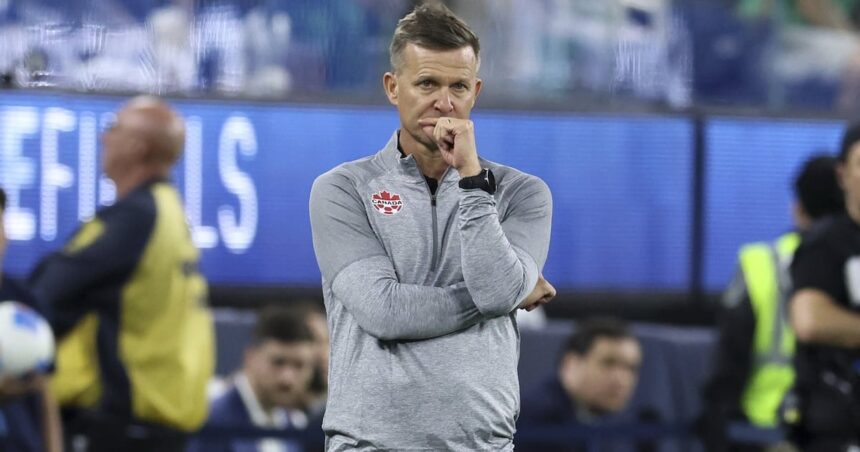As I watched the tense moments unfold during Canada’s contentious Gold Cup semifinal last month, the sideline energy of Jesse Marsch told a story beyond the scoreline. Now, those passionate protests have culminated in serious repercussions that could shape Canada Soccer’s immediate future.
The Confederation of North, Central America and Caribbean Association Football (CONCACAF) handed down multiple sanctions against Canada’s men’s national team coach yesterday, including a significant five-match suspension and an undisclosed fine. The disciplinary action stems from what officials described as “aggressive behavior towards match officials” during Canada’s heated 2-1 loss to Mexico in Chicago on June 10th.
“The decisions made in those critical moments fundamentally altered the match,” Marsch told me during a phone conversation this morning, his voice carrying the unmistakable weight of frustration but also resolve. “I’ll always defend my players with everything I have, but I also understand there are consequences to how we express that passion.”
The incident that triggered the sanctions occurred in the 78th minute when referee Said Martinez awarded Mexico a penalty after minimal contact from Canadian defender Alistair Johnston. Marsch’s animated protests – which included throwing his jacket and confronting the fourth official – resulted in his immediate ejection from the technical area.
For Canada Soccer, an organization already navigating financial challenges and restructuring efforts, these sanctions arrive at a particularly difficult moment. The men’s program had been gaining momentum following their return to the World Cup stage in 2022, with expectations building toward co-hosting duties in 2026.
“We’re reviewing our options regarding an appeal,” confirmed Earl Cochrane, Canada Soccer’s General Secretary. “While we respect CONCACAF’s disciplinary process, we believe certain aspects of the decision merit further examination.”
The suspension means Marsch will miss critical upcoming CONCACAF Nations League fixtures against Jamaica and potentially the quarterfinal stage – competitions that serve as valuable preparation for World Cup qualifying.
Dr. Melissa Thompson, sports psychology researcher at the University of British Columbia, points to the unique pressures facing national team coaches in tournament settings. “These are compressed, high-stakes environments where years of work can hinge on singular decisions,” she explains. “The emotional regulation required is extraordinary, especially when perceived injustices occur.”
What makes this situation particularly challenging is the timing. Canada Soccer had hired Marsch in February specifically for his competitive fire and tactical acumen after a distinguished coaching career with clubs like RB Leipzig and Leeds United. His appointment represented a significant investment in elevating the program’s profile ahead of the 2026 World Cup.
When I visited Canada Soccer’s training facility in Toronto last April, the transformation under Marsch was already evident. Players spoke of renewed tactical clarity and competitive edge. Veteran midfielder Jonathan Osorio described the American coach as “someone who fights for us but also demands excellence.”
This duality – the passionate advocate versus the disciplined professional – now sits at the heart of Canada Soccer’s dilemma.
CONCACAF’s disciplinary committee also levied organizational sanctions against Canada Soccer, including a $50,000 fine for “failure to control team officials” and a formal warning about future conduct.
The federation’s financial constraints make this fine particularly burdensome. Internal documents obtained by Mediawall.news reveal Canada Soccer operated with a $4.2 million deficit last fiscal year, largely due to ongoing legal disputes with the women’s national team and diminished corporate sponsorships.
“The financial penalty is substantial for an organization our size,” acknowledged a senior Canada Soccer board member who requested anonymity to discuss sensitive matters. “But more concerning is how these incidents affect our standing with continental authorities ahead of co-hosting the World Cup.”
Historically, sanctions against coaches rarely extend beyond three matches, making Marsch’s five-match ban notably severe by CONCACAF standards. When Mexican coach Miguel Herrera received a similar suspension in 2015, it dramatically altered their competitive trajectory.
Sports governance expert Dr. Richard McLaren of Western University, who led investigations into Russian doping scandals, offers perspective on the disciplinary process. “Governing bodies like CONCACAF must balance maintaining match official authority with understanding the emotional components of high-stakes competition,” he notes. “The challenge is applying consistency across different incidents and nations.”
For Canadian players, navigating these next matches without their head coach presents both challenge and opportunity. Assistant coach Mauro Biello will likely assume interim duties, having previously led the squad during transitional periods.
“Jesse brings something special to our environment,” Canadian striker Jonathan David told reporters at his club training in France yesterday. “His absence will be felt, but he’s built something sustainable that we can carry forward even when he’s not on the sideline.”
As the team prepares for their upcoming fixtures, the situation highlights the delicate balance between passion and professionalism required at international football’s highest levels. While Marsch’s advocacy for his players undoubtedly strengthened internal bonds, the resulting sanctions now threaten to disrupt critical preparation windows.
Standing at this intersection of discipline and advocacy, Canada Soccer faces difficult questions about supporting their coach while maintaining positive relationships with governing authorities – relationships that will prove crucial as the nation prepares for its biggest sporting moment in 2026.
The path forward requires careful navigation of appeal options, interim leadership arrangements, and perhaps most importantly, cultivating a team identity that carries Marsch’s competitive spirit without crossing disciplinary boundaries.






